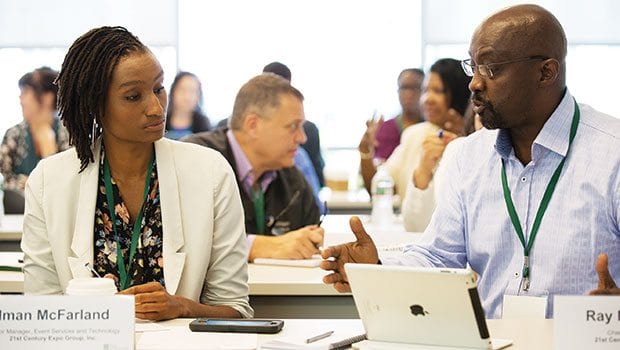The importance of the web
Digital presence is key for minority businesses

Maintaining a digital presence is crucial to all business in today’s Internet-driven and increasingly mobile-dominated market. For small businesses, digital know-how can mark the difference between closing shop quickly and growing into a thriving company. And for minority businesses, argues Dartmouth professor Alva Taylor, digital excellence is even more essential.
“It is very important for entrepreneurs to have digital knowledge and digital excellence in their business. That is important for growth,” said Taylor, Faculty Director of the Tuck School of Business’ Glassmeyer/McNamee Center for Digital Strategies.
Digital strategies such as content marketing can level the playing field for minority businesses and open doors in ways that never existed before, he added.
Whether folks want to admit it or not, minority businesses still face barriers and biases that they are not as good as other non-minority companies, Taylor said.
The use of digital media helps eliminate preconceptions by keeping the focus on the products and services, not on who is offering them.
“You don’t have the bias and the filters you often have,” Taylor said.
Biases often prompt minority business owners to rely on a small network of professional colleagues, which may be fine for support but does not help expand business opportunities.
By using social media, they can expand their access to support, capital, hiring and what Taylor calls “decision makers.”
Typically, a decision maker is a high-level executive at a big company that can make the call on what smaller companies with which it will do business and make investments. Getting one of these executives on the phone is all but impossible, but digital access is more readily secured.
“In the digital world those barriers are still there, but they are much less, and you can have direct access to customers,” said Taylor. “The ability to connect is so much easier.”
Moreover, big companies expect a certain level of digital knowledge and competence. If small businesses don’t have it, they’ll have no shot at working with the big ones.
Digital excellence
These are some of the reasons that Dartmouth’s Tuck School of Business has teamed up with Google. Tuck has a longstanding commitment to growing minority entrepreneurship — its minority executive education program is 35 years old — and Google has ramped up its efforts to collaborate with small businesses, particularly through its Small Business Supplier Diversity Program.

Author: Photo courtesy of GoogleDartmouth Prof. Alva Taylor, faculty director of the Tuck School of Business’ Center for Digital Strategies, speaks to participants in the Digital Excellence Program for Minority Entrepreneurs.
Google was the sponsor of the three-day Digital Excellence Program, which ran June 9-11 at Google’s Kendall Square offices. The agenda featured sessions on constructing a digital strategy, marketing businesses online, managing digital communities, and learning how to use digital analytics. Taylor was a lead instructor, along with Google experts who offered insights into website design, search engine optimization and successful digital business models.
These are things that today’s small business leaders need to know, but not all of them do. By the end of the program, participants were ready to make changes that would impact their business, Taylor said.
He emphasized the importance of top-level engagement, and sharply cautioned those small business leaders who think that pawning off digital strategy to some low-level employee is enough.
“We told them that the perfect mix is two people from the company working on this — the CEO and whoever handles the online digital assets,” Taylor said. “The CEO must understand strategically how to do [social media] and its impact.”
He also scolds small businesses that don’t keep an up-to-date “About Us” page on their company’s website, emphasizing that 80 percent of the time that’s where potential business partners go before they make their decision. “That is the first point of contact,” he said. “Have an informative page, not a throw-away page. This is important digital behavior. You have to know it.”
The program also challenged skeptics of social media and its importance.
“People say, ‘I hate social media. Do I even have to be on social media?’ But ‘hate’ doesn’t matter. What matters is knowing whether it helps or hurts you,” Taylor said. “If it doesn’t help, you shouldn’t spend time on social media. But if it does help, you have to spend time on it.”
The plan is to offer the program several times a year in different parts of the country. Taylor expects it to return to Boston next year.
For him it is all part of helping minority companies be more competitive.
“It is exactly what minority executives need to know and I am happy we are doing the program. I don’t care where they get it. I just care that they get it,” Taylor said. “You have to be digitally excellent going forward and there is probably no way around it.”
Tech forward
On the Web
Glassmeyer/McNamee Center for Business Strategies: http://digitalstrategies.tuck.dartmouth.edu/
Twitter: @CenterDigital, https://twitter.com/centerdigital
YouTube: www.youtube.com/user/TheCDSatTuck
Facebook: www.facebook.com/CenterDigital
Digital Excellence Program for Minority Entrepreneurs: http://exec.tuck.dartmouth.edu/programs/minority-programs/digital-excellence-program-for-minority-entrepreneurs
Google’s Small Business Supplier Diversity Program: www.google.com/diversity/suppliers/
One participant, Ray McFarland, founder and CEO of 21st Century Expo Group, a trade show general services contractor base in National Harbor, Md., certainly got the message.
“What I discovered going through this program is, there is a world of opportunity for those business and companies that are able to execute a digital strategy that incorporates social media, as well as the latest tools that technology has to offer,” McFarland said.
Having started his business in 1991, the 61-year-old McFarland admitted that he has mostly kept to the same business approaches he used back before the digital revolution. He knows he hasn’t kept pace with the changes in the marketplace, but he also had no clue how to start to address this, which is why he was interested in the program.
During one session, the 21st Century Expo Group’s website was put to the test and found lacking, something the company already is addressing.
McFarland also has started using social media to broaden his network. He’s created a role in the company for someone responsible for carrying out digital strategies. In this case, it’s his daughter Iman McFarland, who also attended the Tuck / Google exec ed program.
As for monitoring impact, McFarland intends to use Google’s analytical tools to track digital performance, along with development of a Google AdWords campaign.
“The whole thing has brought technology to the top of the mind now for us,” McFarland said. “Whenever we look at a new customers or relationships we first ask the question of where it fits into the digital strategy and how do we address the needs digitally.”






